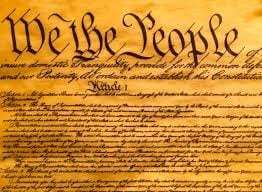The Volokh Conspiracy
Mostly law professors | Sometimes contrarian | Often libertarian | Always independent
Hollywood and the Constitution

As Eugene Volokh notes, Time recently published an article quoting various legal scholars on possible film and TV plots involving constitutional crises:
If James Madison were alive today, he might be working as a screenwriter in Hollywood.
TV dramas can't get enough of obscure constitutional scenarios. On Scandal, an unsuccessful assassination attempt left the vice president temporarily in charge of the Oval Office. On Veep, a tie in the Electoral College sent the election to the House of Representatives. And on Designated Survivor, the Secretary of Housing and Urban Development was sworn in after a terrorist attack.
And that's not to mention just about everything on House of Cards.
But while these plotlines may seem a bit over the top, legal scholars say they are a useful way to tease out some of the weak points in the U.S. Constitution for a broader audience. Given the events of recent years-an impeachment, the Supreme Court intervening in a crucial election recount and recent talk of contested conventions and faithless electors-they may not be as implausible as they sound.
"It may be one of those areas where reality is getting a little bit ahead of fiction," notes Ilya Somin, constitutional law professor at George Mason University.
With that in mind, TIME talked with legal experts about their favorite constitutional scenarios.
In the Time article, Ryan Beckwith skillfully outlines several possible constitutional crises that would both make good movie plots and have at least some plausible chance of occurring in real life. As he notes, several movies and TV shows have already addressed similar constitutional issues. But I fear that Hollywood may be focusing our attention in the wrong place. It is entirely understandable that TV and film producers would focus on scenarios that make for good entertainment. But I am skeptical that these kinds of sudden crises centered on discrete provisions of the Constitution are the perils we most need to worry about.
When I spoke to Beckwith, I instead emphasized the possibility that the real danger to constitutional democracy in the United States is not a dramatic, sudden crisis but a gradual deterioration of constitutional norms. For example, public and elite commitment to free speech, separation of powers and other safeguards against abuse of power could gradually fray, resulting in a process of democratic "deconsolidation." Unscrupulous presidents could further concentrate power in their hands, often in ways that don't immediately set off alarm bells. They might, for example, undermine the rule of law by taking actions that are - at least initially - actually popular. Growing partisan bias might extend the already worrisome pattern of both Democrats and Republicans excusing abuses committed by presidents of their own party.
The public is likely to notice and react negatively to a sudden, dramatic attack on constitutional democracy of the sort that makes for a good Hollywood plot. It is much more likely to overlook gradual deterioration - especially if the latter is packaged with popular policies.
Both George W. Bush and Barack Obama have done a good deal to undermine constitutional limits on federal power, often with the support of their respective parties. For example, Obama has twice initiated wars without getting congressional authorization required by the Constitution and the War Powers Act. The election of Donald Trump - a man with little if any regard for constitutional principles - is hardly a reassuring sign that this pattern will reverse itself. At the very least, we must be more vigilant about the gradual deterioration of constitutionalism than most Americans have been over the past 15 years.
Slow-motion threats to constitutional norms do not make for as good a movie plot as a sudden crisis. I don't blame the author of the Time article for largely ignoring such scenarios. Nonetheless, both Hollywood and the general public would do well to give this danger more consideration.


Show Comments (0)